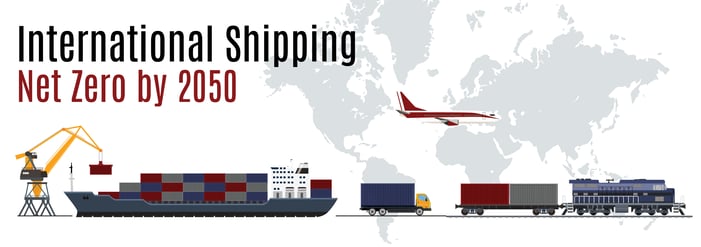We have previously discussed sustainability within the supply chain and the efforts that must be undertaken to ensure future generations, as well as today’s generation are not negatively impacted by the choices we make. It’s important to not overlook how logistics and shipping contributes a significant amount of carbon emissions. According to World Economic Forum the shipping industry contributes to almost ‘3% of the global greenhouse gas emissions annually and if it were a country, it would be the sixth largest emitter’. So, when companies, particularly the shipping industry are considering how they can lower their carbon footprint, it comes down to the journey those goods have taken, to get to the destination.
The journey a product makes from a supplier to the customer is not always simple and typically requires multiple methods of transport to get there, including ships, planes, lorries etc. We are consistently being told that we need to make a change now, before it is too late to undo the damage that has already been made to the environment. As the impact of global warming will impact everyone around the world, it will be extremely beneficial for companies in the shipping industry to create targets to reduce their carbon emissions and take action to meet them.
After the COP26, the international shipping sector will feel the pressure now more than ever to consider how they can reduce carbon emissions, with now being the time to act. In July 2023, The International Maritime Organization set a net-zero goal by or around 2050. Which ‘is not only a crucial step for shipping, a sector that is excluded from the Paris Agreement, but for the international climate collaboration and the global economy’. This will encourage shipping companies to invest in cleaner alternatives and hopefully by working together a viable solution can be available at a scale that meets the demand.
It is clear the impact international shipping has on the environment, but this method of transportation is key to the movement of goods, with ‘90% of global trade being carried via ships’, it is important that a sustainable method can be implemented. In line with the Paris agreement, the shipping industry committed to meet a 1.5 degrees Celsius target by 2030, with a goal of having ‘scalable zero-emission fuels to make up 5% of the international shipping fuel mix’. With less than seven years to reach this target, how will this be achieved you may ask.
This will be a challenge, it requires a revolution in clean fuel technologies, an efficient design of ships and supportive infrastructure. Most shipping vessels rely on fossil fuels, a viscose fuel oil, which has been used in the shipping industry since the 19th century. The benefit of this type of fuel is that it has a high energy density and ships can travel a long distance using a small supply of fuel. Making it relatively cheap to run. But the negatives outweigh the benefits when it comes to climate change. Harmful pollutants enter the atmosphere when the burning of fuel creates carbon (soot), contributing to global warming and increases risk of human health.
To work towards net-zero emissions alternative low-carbon fuels are currently the best option but what is currently available on the market is limited, with liquified natural gas (LNG) being the main choice. It has been around for 20 years and emits 25% less than carbon dioxide, however, it is still a fossil fuel and carries the risk of methane leaks, which has almost over 30 times the warming power of carbon dioxide. But it is considered the best option due to its zero-sulfur content, which meets International Maritime Organizations, 2020, sulfur cap requirements.
UCL conducted a study and concluded ‘if the global shipping fleet to LNG could lead to financial losses of up to $850 billion by 2030. This is based on the assumption that by 2030 the industry will be rapidly moving away from fossil fuels and expensive LNG-capable fleets will rapidly lose their value.’ If current vessels are not compatible with cleaner fuels, this will result in many vessels being made useless, unless they can be converted to be compatible with clean fuels. Shipping companies must decide how they should invest, to determine what is the most environmentally friendly choice and consider what is best for the future.
Clean Fuel Alternatives
Methanol is an option for clean fuel, Maersk one of the industry’s leading companies have invested in green methanol, a climate-neutral alternative. The challenge with this option is being able to capture carbon dioxide and hydrogen at a scale that meets demands. Ammonia, Hydrogen, Biofuels, and electric ships are all other clean alternative options. However, vessels would need to be redesigned to suit these types of fuels. Ammonia emits almost no carbon dioxide, but is extremely toxic, and hydrogen while the only by-product is water, it can be extremely flammable. The production of Biofuels relies on biomass and animals and there are ethical concerns when land is prioritised to produce biomass over food. Electric alternatives would be a great option but are only practical for shorter journeys and would still rely on fossil fuels, for longer journeys.
Conclusion
The future of net-zero emissions in the shipping industry relies mostly on the production and sustainability of cleaner fuel choices. The production of many fuels, such a hydrogen and ammonia require large amounts of energy, so can only be considered net-zero if the production of these fuels doesn’t have a negative impact. Countries must unite their efforts and scale-up their production in renewable energy and infrastructure. If they do not invest, it will be very challenging for these targets to be achieved. Shipping companies are in a unique position where they can make a positive impact on other industries and help improve their carbon emissions, as well as enhancing air quality which greatly benefits human health.
We hope you enjoyed reading this week’s blog and learnt something new. Leave a comment below to let us know your thoughts and why not suggest any topics you’d like to read about in the future. If you’d like to share the blog with others who may also enjoy reading it, please do!

